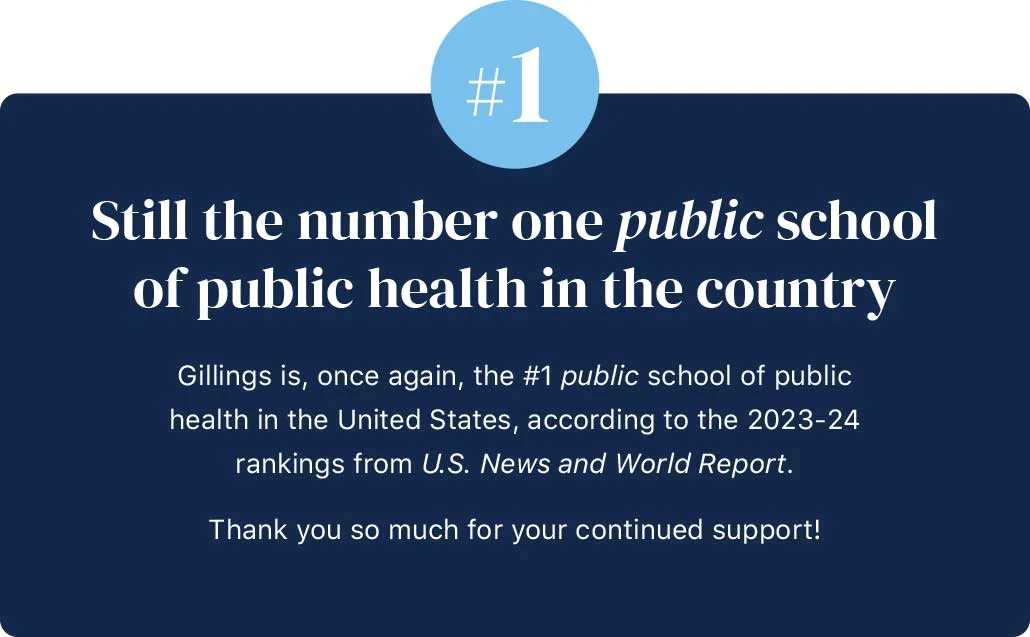Beth Moracco researches strategies to prevent violence
Dr. Beth Moracco has dedicated her career to researching gender-based violence, policy advocacy, and creating safer communities through public health.
Beth Moracco, PhD, associate professor in the Department of Health Behavior and interim director of the UNC Injury Prevention Research Center, has studied gender-based violence for over 25 years, investigating topics like domestic violence, sexual abuse, sex trafficking, and the intersection of gun violence and gender-based violence.
Moracco was involved with women’s health issues as an undergraduate student, and then she worked with the Peace Corps in the Democratic Republic of Congo. It was through her work in Congo that she first witnessed the burden that gender-based violence places on individuals and communities. She also saw firsthand that many of these issues are preventable.
After completing her Master of Public Health and doctoral degrees in health behavior, Moracco joined the faculty at the Gillings School in 2008.
Moracco’s research is very applied. She has a strong interest in identifying which interventions and policies will be most effective at reducing gender-based violence. Throughout her career, Moracco has engaged with policymakers and state agencies in many capacities.
She has worked extensively with the North Carolina Administrative Office of the Courts, advising on best practices for processes in civil domestic violence cases and on how to bring trauma-informed processes into the court system.
“Engaging with public policy is vitally important, because the more public health research informs policy, the more effective policies will be at addressing these important issues.”
She is also a member of the N.C. Violent Death Reporting System advisory board, providing guidance on how the statewide surveillance system can be implemented and how the state can use these data to reduce the number of violent deaths.
She is also on the advisory board of the N.C. Office of Violence Prevention within the Department of Public Safety.
“Public health practitioners have both empirical and practice-based evidence that can inform effective policy,” said Moracco. “Engaging with public policy is vitally important, because the more public health research informs policy, the more effective policies will be at addressing these important issues.”
Moracco was involved with the push to have questions about intimate partner violence incorporated into routine primary care visits in N.C. While this has now become standard practice, particularly in prenatal care and emergency department settings, when it was first initiated more than 30 years ago, there were significant barriers.
“Many health care providers felt that they would know if a patient was being abused; they didn’t feel equipped to counsel patients who were suffering abuse, and many were concerned that their patients would be offended by the questions,” said Moracco. “Our role was to show providers that domestic violence doesn’t fit a stereotype, has far-reaching health implications for their patients and that they as providers aren’t expected to do it all. They are just the first line of defense in providing the screening and, ideally, information about community-based resources.”
Moracco worked with the N.C. Coalition Against Domestic Violence to develop a standard screening tool that providers would use with patients and a process for how to connect patients with resources and counseling if they were experiencing violence at home.
More recently, Moracco’s research has focused on the intersection of gun violence and gender-based violence, with a focus on the prevention of gun sales and possession among people subject to a domestic violence protective order. Policies restricting gun access to domestic abusers are included in N.C. state statutes and have broad bipartisan support, but questions remain around the implementation and enforcement of these policies. Moracco is studying the gaps in how these laws are implemented and which policy changes could reduce gun deaths in intimate partner violence settings.
“The Gillings School is a leader in collaborative research that informs policy,” said Moracco. “We have a very collaborative relationship with the state in ways that benefit everyone. I’m honored to be a part of it and excited to see more and more of our students recognizing the importance of engaging with public policy and conducting research that can inform policy.”
In July 2023, Moracco became chair of the faculty at UNC-Chapel Hill, where she represents all faculty at the University.
“It’s an honor to be in this position, and I hope that I can bring the tools from my work as a researcher to inform the position and best advocate for the University and its faculty,” said Moracco.




